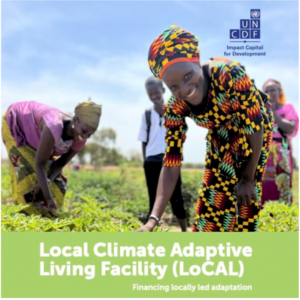Financing Locally Led Adaptation Action Through International Climate Finance – Putting the Right Mechanisms In Place
 Even though climate finance has significantly increased over the last decade, there is a strong recognition of the fact that very few local and sub-national institutions (see WRI/ Oxfam/ ODI 2015, Friis-Hansen et al. 2022) have direct access to international climate finance. In addition, there is still a lack of transparency in donor reporting on how much climate finance reaches the local level and involves community participatory processes.
Even though climate finance has significantly increased over the last decade, there is a strong recognition of the fact that very few local and sub-national institutions (see WRI/ Oxfam/ ODI 2015, Friis-Hansen et al. 2022) have direct access to international climate finance. In addition, there is still a lack of transparency in donor reporting on how much climate finance reaches the local level and involves community participatory processes.
However, international adaptation finance passes through numerous mechanisms and channels (CPI reports and analyses, UNEP 2023), from the international to the local level, and does not always reach the poor and marginalized people who need it most.
Adaptation funding still struggles to be effective and reach those who need it most, developing countries themselves need to own and be invested in the process, with a focus on developing country-led adaptation strategies.
PlanAdapt is partnering to provide technical support services to UNCDF, potentially in over 40 countries that have started to integrate and employ the Local Climate Adaptive Living Facility (LoCAL) mechanism.
- A partnership with Carbon and Environmental Research (CER), Centre interprofessionnel technique d’études de la pollution atmosphérique (CITEPA), led by Adelante Knowledge & Development, focusing on technical support for
- climate change adaptation capacity building and institutional strengthening;
- climate mainstreaming in local development planning and budgeting;
- green and climate-sensitive governance;
- public financial management; and
- performance-based climate financing mechanisms.
- A partnership with Carbon and Environmental Research (CER), Adelante Knowledge & Development, led by OIKO, focusing on technical support for
- development and roll-out of tailored climate information services;
- climate risk and vulnerability assessments; and
- mainstreaming of science-based evidence on climate risks into local-level adaptation planning.
With its mandate and instruments, UNCDF offers “last mile” finance models that unlock public and private resources in least-developed countries to reduce poverty and support local economic development. UNCDF’s financing models work through two channels:
- financial inclusion that expands the opportunities for individuals, households, and small businesses to participate in the local economy, providing them with the tools they need to climb out of poverty and manage their financial lives; and
- by showing how localized investments – through fiscal decentralization, innovative municipal finance, and structured project finance – can drive public and private funding that underpins local economic expansion and sustainable development.
The LoCAL, designed by the UN Capital Development Fund, provides a country-based mechanism to integrate climate change adaptation into local governments’ planning and budgeting systems in a participatory and gender-sensitive manner, and increases the amount of finance available to local governments for climate change adaptation. LoCAL combines performance-based climate resilience grants (PBCRGs), with technical and capacity-building support. It uses a demonstration effect to trigger further flows for local adaptation, including national fiscal transfers and global climate finance for local authorities, through their central governments. The LoCAL approach provides the basis for international standard ISO 14093:2022.
LoCAL typically operates through three phases based on the country context.
- Phase I – Piloting consists of initial scoping, followed by testing in two to four local governments. Phase I countries are Lao PDR, Lesotho, Niger, Nepal, Tanzania and Tuvalu.
- Phase II – Learning takes place in 5–10 local governments in a country. It involves collecting lessons and demonstrating the LoCAL mechanism’s effectiveness at a larger scale. Bangladesh, Benin, Ghana, The Gambia and Mozambique are currently in Phase II.
- Phase III – Scaling-up is full national roll-out of LoCAL based on the results of the previous phases and lessons learned (Bhutan and Cambodia are currently in the third phase). During this phase, LoCAL is gradually extended to all local governments, with domestic or international climate finance, and becomes
PlanAdapt has gained significant expertise and experience in related previous projects:
Learning From Climate Action and Valuing Practitioners’ Views in Cambodia
Integrating Climate Risk Management Across the Entire Governmental System in Cambodia
How to Finance Climate Change Action in a Country That is at the Doorstep of the European Union
